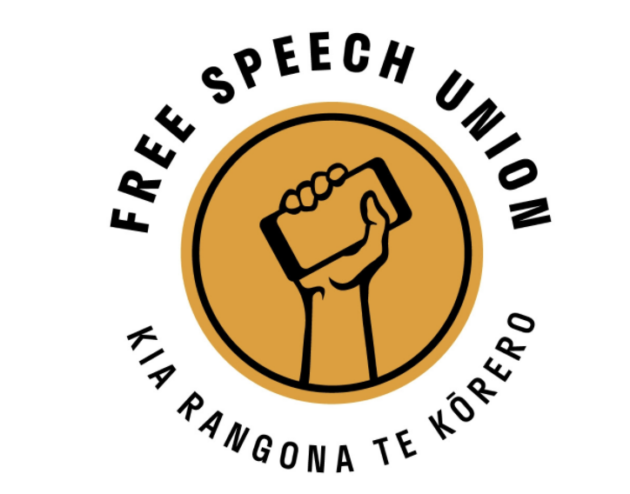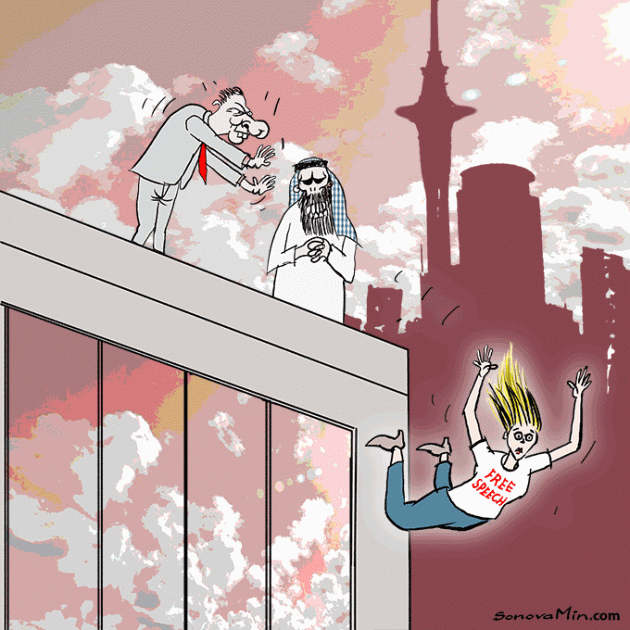
The Free Speech Union is announcing its support of an appeal to the Supreme Court, of parts of last month’s Court of Appeal decision in the Goff “divisive speaker ban” case. Last month, the Court of Appeal told Auckland Council it could not hide from human rights law behind a trust, or council-controlled organisation (CCO). The Court held that Regional Facilities Auckland Limited, the CCO set up to manage City-owned meeting venues, must uphold free speech rights as if it was the Council.
Why this further appeal?
Because despite the Court of Appeal’s support for free speech, its decision left a huge ‘health and safety’ loophole. They recognised the Thug’s Veto problem – that a right to free speech could be empty if a violent protest threat lets an authority ban the speech instead of the violence. But the Court of Appeal judges stopped after describing the problem as if solving it was not their job. It was their job to say how much should be done about thuggish threats before they can override free speech rights. But they weirdly passed that ball into space.
So it is sad but perhaps not surprising to learn that three councils, including Auckland’s RFAL are to be ignoring the Court’s statements upholding free speech. They are citing ‘health and safety’ concerns to prevent people from using their premises to discuss a bill before parliament.
Two weeks ago some Free Speech Union members gave us direct evidence in another case, that councils are ignoring the judgment. The group Speak Up For Women (SUFW) booked public meeting venues to discuss government law change plans. Council staff told them it was cancelled and did not even bother to manufacture concerns about safety threats from law-breaking protestors. They have simply asserted power to exclude SUFW less than a month after the court decision that they are bound by law protecting freedom of speech.
Dr David Cumin, a spokesman for the Free Speech Union, and an applicant in the appeal, says:
“The Court of Appeal may have thought its decision upheld freedom of expression balanced against risks of violent protest. The Council response in the real world shows it did not work. Auckland Council is acting as if the Court’s ducking of the Thug’s Veto issue was ‘nudge nudge wink wink’ on the judgment’s free speech statements.”
“We feared that Councils would treat the judgment as an invitation to manufacture spurious excuses when you want to gag citizens. But now they’re not even bothering with that. They’re treating the free speech protection in section 14 of the Bill of Rights Act as if the Court had never mentioned it.”
Auckland Council staff this time conceded to the women’s group that they do not create a risk of violence (from protestors). That was Auckland Council’s excuse to SUFW last time, when forcing them to shift the meeting to a remote unstaffed hall lacking convenient public transport.
This time Council staff offered various explanations but finally “justified” cancellation on the basis that “it was more a staff well-being point of view…people there have come to us with concerns and we have to manage that”. Later the same excuse was broadened from staff – “because of the content that you’ll be discussing [the government’s bill to change the law] it could be harmful to the members of the community associated with [the premises booked for the meeting]…the staff onsite are the ones…we are taking their welfare and their health and wellbeing into consideration there. That’s why an alternative venue would be…where there is no staff onsite”
“This can’t fit any version of freedom of speech,” says Dr Cumin. “It is blatant discrimination on the grounds of political belief. Our Court of Appeal decision did not bother to discuss the unlawful discrimination illegality. Nor did it forcefully remind the Council and its staff that they control assets on trust for all citizens, not just those whose politics they like. New Zealand’s rule of law inheritance will mean little if Auckland Council can cancel a women’s group meeting because hall staff oppose the views they think might be expressed on a Bill before Parliament.”
“So the Free Speech Union wants the Supreme Court to give practical directions. People in charge of public facilities should know exactly what the law requires of them. They should know what they must do to preserve free speech rights in the face of bullying protest threats and feelings of public servant about effects on their wellbeing from unwelcome opinions.”
Background – the High Court decision
The case started in the High Court, to get a ruling on Mayor Goff’s claim to have power to ban speakers he considered divisive, from City-owned halls. We have two representative plaintiffs. One is our spokesperson, Dr David Cumin, an Auckland resident and a member of Jewish organisations worried about being shut out of public facilities if the Council can blame the victims, instead of standing up to anti-Semitic hate groups. The other plaintiff, Malcolm Moncrief-Spittle is a book-seller who wanted to see the two controversial speakers speak and be questioned in person.
After we applied to the High Court, the Council defended the Mayor with evidence that his radio claims were false – he had no power to ban. They said that instead, the decision was solely that of CCO management, fearing violent protests. We decided we could not leave the case at that. It would have effectively conceded the Thug’s Veto – a ‘might is right’ burial of the free speech rights of peaceful people.
We were stunned when we lost and the High Court judge found for the Council. Justice Jagose blessed the claim that RFAL were not bound by the Council’s duty to uphold free speech rights. His decision was treated by the Mayor and others as an endorsement of their claims, including that the protest threat excused immediate cancellation of the booking. There had been no consultation with the organisers on security precautions, no offer of an alternative venue. The cancellation proceeded without even finding out the Police view on whether the protest threats were serious, and how the Police might manage them.
We had to appeal. Free speech rights in public spaces and venues across New Zealand needed protection from such an odious precedent.
Our lead barrister, Jack Hodder QC, and our solicitors, Franks Ogilvie, did not charge their time for that appeal. They felt it was essential to challenge a High Court decision so dangerous to civil liberties.
Detail of Court of Appeal decision
We were pleased by the Court of Appeal decision at first. It told the Mayor and Council they could not hide behind Regional Facilities Auckland, pretending that its separate legal status freed RFAL from the duties on people administering public facilities. The Court of Appeal held the High Court judge was wrong to say that our representative plaintiffs were on a personal crusade, without public interest in the principles at stake. And we were relieved by the appeal decision to cut the costs awarded against us by 70% because of the importance of the issues.
We were disappointed that the Court of Appeal excused the hasty cancellation because the event organisers should have warned the hall managers about possible lawbreaking protest. But with the welcome reversal of the worst aspects of the High Court ruling, we believed we’d made worthwhile use of the public donations for the case. We expected the Council to realise its defence only succeeded on a dodgy victim-blaming argument. We thought the Council’s lawyers would make sure the Council knew it had to uphold freedom of speech.
We’re sure the Court of Appeal judges did not mean the Council to feel they were getting carte blanche to discriminate against views they dislike. The judges probably thought they were putting a shot across the bows of public officials tempted to abuse their powers. But their decision was legally ambiguous. When people can’t work out what court statements mean in practical application, they’ll ignore them, or feel that the Court can’t have thought it is very important, or decide the decision means what they want it to mean.
The insolence of the Council
Now the Council/RFAL has cancelled another booked meeting for a group, “Speak Up for Women”. So have Christchurch libraries and Dunedin City Councils. Speak Up for Women wanted to use the venues to discuss proposed legislation. The Councils claim they are concerned that such discussion will make Council facilities staff feel unsafe.
So we have asked the Supreme Court for leave to appeal. We want the Supreme Court to spell out the effort, diligence, courage and neutrality that public officials should display, to uphold rights of free speech despite threats. Or even because of them. We want the Court to treat free speech the way courts tell people how much they have to do to show respect for other law, such as employee well-being or to satisfy Treaty obligations.
The Court of Appeal mumbled about a need to develop law to address the “Heckler’s Veto”. Those are weasel words. The veto is the veto of coercion, the veto of authority unwilling to allow unwelcome challenge to its ideology, the veto of threatened violence – ‘might is right’. Allowing the Thugs’ Veto to prevail is rejection of tolerance and rejection of the rule of law.
It is essential now for the Supreme Court to spell out what an institution must do to stand up against gagging pressure. Our courts are supposed to ensure everyone, including Council officers, can know in advance what the law requires.
Application for Leave to Appeal
Court of Appeal Decision
High Court Decision
Please share this BFD article so others can discover The BFD.

